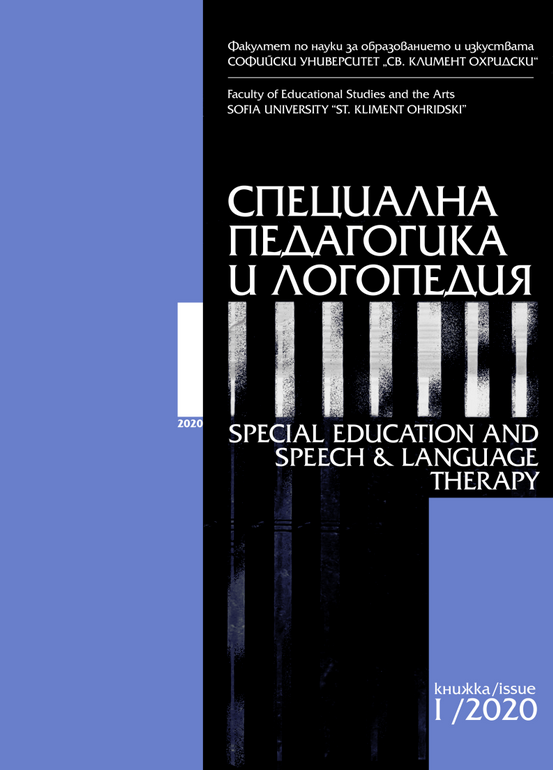Perception of students with special educational needs from their classmates in mainstream class
DOI:
https://doi.org/10.60059/SPL.2020.1.27-45Keywords:
inclusive education, special educational needs, mainstream schools, mainstream teachers, classmatesAbstract
Inclusive education is a process that is interesting for both studying and observing as it follows the logic and policy for the integration of people with different abilities. A lot of studies focus on examining this process in a mainstream educational setting. The growing numbers of schoolchildren with special educational needs creates the necessary prerequisites for studying different attitudes, interrelations among schoolchildren in a class as well as the role of the mainstream teacher in the process. The current study addresses some of these issues. An attempt is made to describe inclusive education as a multi-faceted process which brings together the children and schoolchildren with special educational needs and their teachers, classmates, peers from the informal community they are part of, parents. The interrelations which evolve among them in the process of learning at a mainstream school are of particular interest. The study attempts at showing the attitudes of mainstream schoolchildren to their classmates with special educational needs, the degree in which they are ready to build any relationship with them as well as the attitudes of the mainstream teachers to the schoolchildren with special needs and to inclusive education as well.
References:
Andreev, Y. (1994). Oligofrenopsihologia. Sofia: University Press “St. Kliment Ohridski”.
Dionisieva, K. (1996). Gluhotata v detska vuzrast: ranno otkrivane I vuzdeistvie. Sofia: Setiva.
Dobrev, Zl. (2008). Integriranoto obuchenie na decata sus SOP i resursnite uchiteli - plusove i minusi. SB. Osobenosti na integriranoto obuchenie. Sofia.
Dobrev, Zl. (2009). Suvremenni tendencii v integraciata i obuchenieto na deca s umstvena izostanalost. University Press “St. Kliment Ohridski”.
Evgenieva, E. (1999). Problemyt za integriraneto na deca s intelektualna nedostatychnost. Pedagogika, 12, 24-32.
Evgenieva, E. (2007). Anketno prouchvane sred uchiteli za nachaloto na procesa na integrirane. Specialna pedagogika, 1, 62-74.
Kaneva, S. (1985). Pedagogicheska rehabilitacia na deca s cerebralna paraliza. DI “Narodna Prosveta”, Sofia.
Karadjova, K. (2010). Determinanti na integriranoto obuchenie pri deca s intelektualna nedostatuchnost. University Press “St. Kliment Ohridski”, Sofia.
Ministry of Education and Science, Repulic of Bulgaria (2017). Naredba za priobshtavashto obrazovanie. https://www.mon.bg/upload/22124/nrdb_priobshavashto_izm271219.pdf.
Popzlateva, C. (2010). Choveshkata gluhota – socio-kulturna identichnost I profili na lichnostta. Sofia: Es print.
Radulov, Vl. (1995). Integriranoto obuchenie I specialnite uchilishta. Shumen: Aksios.
Shosheva, V. (2013). Integrirane na decata sus specialni obrazovatelni potrebnosti v usloviata na detskata gradina. Ministerstvo na obrazovanieto, mladejta I naukata, Proekt No BG051PO001-3.1.03-0001. Kvalifikacia na pedagogiqeskite specialisti.
Stoyanova, P. (2009). Decata sus specialni obrazovatelni potrebnosti – tehnite semeistva i drugite, SB. Formirane na umenia za suvmestna rabota na deca sus SOP v usloviata na integriranoto obuchenie, Shumen.
Terziiska, P. (2005). Integriranoto obuchenie na deca sus SOP. Blagoevgrad: Univ. izd. “Neofit Rilski”.
Trosheva, A. (2003). Metodicheski osnovi za ovladiavane na tehnicheskia component na pisaneto pri uchenici s detska cerebralna paraliza. Specialna pedagogika, 2, 35-41.
Fazlıoglu, Y. (2014). Autism. Sofia: St. Kliment Ohridski Univ. Press.
Jessup, G., Bundy, A., Broom, A. & Hancock (2018). Fitting in or feeling exluded: the experiences of high school students with visual impairments. Journal of visual impairment and blindness (JVIB), 112(3), 261-273.
Rainer, J., Althuser, K. & F. Kallmann (1967). Family mental health problems in a deaf population (2nd edition). Springfield, IL: Charles C. Thomas.
Rezio, G.S., Kayenne, M., & Formigo, R. (2014). Inclusion of children with cerebral palsy in basic education, Physiotherapy [online], 21 (1), 40-46. ISSN 1809-2950. http://dx.doi.org/10.1590/1809-2950/428210114.


